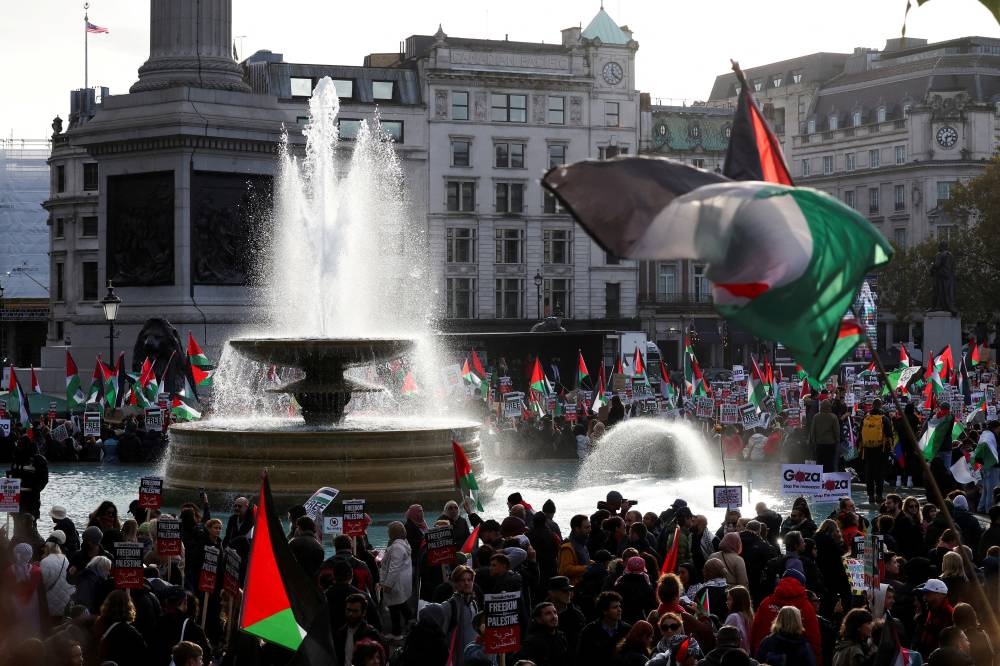A pro-Palestinian rally looks set to take place in London on Saturday, despite government concerns that it could clash with the solemn annual commemorations for Britain's military war dead.
Prime Minister Rishi Sunak's government had put pressure on the Metropolitan Police to ban the protest in the British capital.
Sunak met with Scotland Yard chief Mark Rowley to secure assurances that Armistice Day memorial services would not be disrupted and that the public would be safe from disorder.
"It's welcome that the police have confirmed that the march will be away from the Cenotaph (war memorial) and they will ensure that the timings do not conflict with any Remembrance events," Sunak said afterwards.
But he warned that "there remains the risk of those who seek to divide society using this weekend as a platform to do so".
Sunak earlier said he would hold the Metropolitan Police commissioner "accountable" for his decision to allow the demonstration against the Israel-Hamas war to go ahead.
Tens of thousands of people are expected to take to the streets of London to demand a ceasefire in the month-old conflict.
The Conservative leader says a march on Armistice Day would be "provocative and disrespectful" but organisers have resisted his pleas and those from the Met Police to postpone the demonstration.
Rowley has said the rally, organised by the Stop the War Coalition, does not meet the threshold for requesting a government order to stop it going ahead.
Such a ban was "incredibly rare" and a "last resort" where there is a serious threat of disorder, he said.
"The events taking place this weekend are of great significance and importance to our nation," he added in a statement.
"We will do everything in our power to ensure they pass without disruption."
Sunak said the protest "offends our heartfelt gratitude to the memory of those who gave so much so that we may live in freedom and peace today.
"But part of that freedom is the right to peacefully protest," he added.
"And the test of that freedom is whether our commitment to it can survive the discomfort and frustration of those who seek to use it, even if we disagree with them. We will meet that test and remain true to our principles."
November 11 commemorates the end of fighting in World War I, and the sacrifice of armed forces in all conflicts since 1914.
Protest groups have not indicated they plan to march on Remembrance Sunday, when solemn ceremonies and two minutes' silence are held at war memorials up and down the country.
Organisers have vowed to avoid the Whitehall area of central London where the Cenotaph -- the focal point of Remembrance Sunday -- is located.
A spokesman for Sunak denied that the UK leader was trying to put pressure on the Met chief to call the march off.
"The Met are operationally independent. It's the job of the prime minister and the government to hold them to account for their approach," the spokesman told reporters.
London has seen large demonstrations on four successive weekends since the Hamas attacks in southern Israel on October 7 which Israel says left 1,400 people dead, mostly civilians. They also took 240 hostages.
Since then, Israel has relentlessly bombarded the Palestinian territory and sent in ground troops, with the health ministry in Hamas-run Gaza saying more than 10,550 people have been killed.
Police have made dozens of arrests at the London protests, including for hate crimes.
Sunak's outspoken interior minister Suella Braverman has branded the protests "hate marches".
Downing Street denied that it is "picking a culture war" by attacking the protest and says there is a risk of violence and disorder linked to breakaway groups.
"I think given some of the individuals who've been seen attending these marches, I'm not sure we can completely put full store into trusting that all individuals will behave responsibly," said Sunak's spokesman.

Demonstrators gather at Trafalgar Square as they protest in solidarity with Palestinians in Gaza in London on November 4. REUTERS File Picture.
